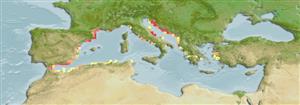Issue
Distribution of this species will be corrected as more studies have confirmed or clarified its occurrence, together with the similar species Gobius incognitus. Further, the colouration and shape characteristics from the diagnoses given in Ref. 110727 could be used to confirm the identity, as either G. incognitus for G. bucchichi, of specimens shown in photographs or species information in published references for the Mediterranean and Atlantic samples as were used for this species in FishBase.
Environment: milieu / climate zone / depth range / distribution range
Ecology
Marine; demersal; depth range 1 - 8 m (Ref. 110727), usually 1 - 3 m (Ref. 110727). Subtropical; 15°C - 24°C (Ref. 27115); 47°N - 30°N, 6°W - 42°E
Mediterranean Sea: eastern half of the Mediterranean Sea, from the Adriatic to the Aegean Sea, and in the Black Sea and Sea of Marmara. All previous records outside this area are most likely for Gobius incognitus Kovačić & Sanda, 2016 (Ref. 110727).
129796
Length at first maturity / Size / Weight / Age
Maturity: Lm 3.6, range 3 - 3.8 cm
Max length : 10.0 cm TL male/unsexed; (Ref. 4696)
Dorsal spines (total): 7; Dorsal soft rays (total): 14; Anal spines: 1; Anal soft rays: 13 - 14. This species is distinguished from its congeners by the following combination of characters: LL 51-55; predorsal scales 20-25; opercle naked (rarely with 2-4 scales visible); pectoral-fin rays 17-18; free tips on 3 upper pectoral rays moderately developed and the first ray shorter than half of the entire ray length; complete pelvic fin disc, its anterior membrane without lateral lobes; anterior oculoscapular canal with pore 'alpha' at rear of orbit; oculoscapular row x1 is not extending forwards to pore ß; suborbital row d is continuous; eye diameter 0.82-1.04 in snout length; there are 2 rows of elongated dots on the cheek and without dots between the middle of the cheek, the lower row starting anteriorly at the angle of mouth and going backwards across the cheek and opercle to the pectoral fin base, the upper row starting at upper lips, going posterodorsally to touch ventral margin of eye and continuing behind eye; upper mark on the pectoral fin single or doubled, reaching downwards to 6th - 7th rays counting from upper end (Ref. 110727).
This species occurs on all kinds of rocky substrata: gravel, cobbles, boulders and bedrock, but on sand only when it is mixed with the hard substratum, thus, never on pure sand. The substratum was bare or covered with short thallus algae and no other biocover in the habitat were recorded (Ref. 110727).
Kovačić, M., J.P. Renoult, R. Pillon, M. Bilecenoglu, F. Tiralongo, S.V. Bogorodsky, S. Engin, O. Kovtun, P. Louisy, R.A. Patzner, S.B.-S. Rothman, A. Soldo and M.B. Yokes, 2023. The delimitation of geographic distributions of Gobius bucchichi and Gobius incognitus (Teleostei: Gobiidae). J. Mar. Sci. Engg 11(art. 516):1-12. (Ref. 129796)
IUCN Red List Status (Ref. 130435)
Threat to humans
Harmless
Human uses
Fisheries: commercial; aquarium: commercial
Tools
Special reports
Download XML
Internet sources
Estimates based on models
Preferred temperature (Ref.
123201): 16.1 - 21.3, mean 18.5 °C (based on 166 cells).
Phylogenetic diversity index (Ref.
82804): PD
50 = 0.5000 [Uniqueness, from 0.5 = low to 2.0 = high].
Bayesian length-weight: a=0.00741 (0.00346 - 0.01589), b=3.08 (2.91 - 3.25), in cm total length, based on LWR estimates for this Genus-body shape (Ref.
93245).
Trophic level (Ref.
69278): 3.1 ±0.0 se; based on diet studies.
Resilience (Ref.
120179): High, minimum population doubling time less than 15 months (tm=1; Fec = 1,200).
Fishing Vulnerability (Ref.
59153): Low vulnerability (10 of 100).
Nutrients (Ref.
124155): Calcium = 298 [135, 737] mg/100g; Iron = 1.54 [0.79, 3.35] mg/100g; Protein = 18 [16, 20] %; Omega3 = 0.199 [0.082, 0.428] g/100g; Selenium = 15 [6, 36] μg/100g; VitaminA = 18.6 [4.6, 72.1] μg/100g; Zinc = 1.46 [0.92, 2.31] mg/100g (wet weight);
